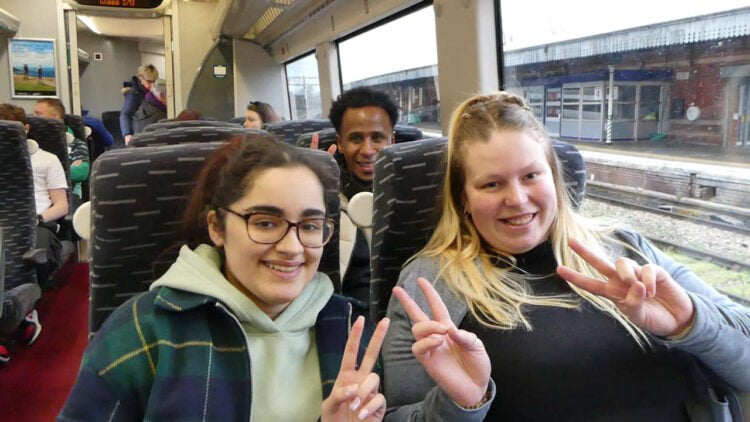In an initiative coordinated by Community Rail Network, 400 young people have been involved in grassroots ‘community rail’ activities that show how rail and public transport can be useful in unlocking opportunities, boosting confidence, and forging social bonds.
The ‘Engaging Young People with Community Rail’ project was funded by the Department for Transport, and was designed to explore ways in which the risk of loneliness among young people could be reduced, which is the age group most likely to report feeling lonely.
Three projects were chosen as pilots: ‘Movement’ in Gloucestershire & Bristol, run by Gloucestershire Community Rail Partnership (CRP) and Severnside CRP, ‘Making Connections’ in Blackburn with Darwen, run by Community Rail Lancashire; and ‘C-O-N-N-E-C-T-E-D’ in Newcastle & County Durham, run by youth and family charity Catch22.
Each project involved collaboration with Dr Miriam Ricci, formerly of the University of the West of England (UWE), Bristol, to ensure the work was evidence-led, engaging and empowering. Building on experience across the community rail movement, which comprises community-based groups and organisations throughout Britain, the projects were dedicated to engaging and empowering local communities to use their local railways and stations and to promote sustainable and inclusive travel.

In each pilot, groups of young people, many with social anxiety and mental health problems, were introduced to their local rail network through planning journeys and building confidence in trips by rail to rural, coastal, heritage and cultural locations. They also carried out creative and social activities such as writing or visual art, worked with community partners, and discussed how rail can open up opportunities and its advantages.
Benefits felt by the young people, aged 15-24, included:
- 60% felt more confident travelling by train;
- 65% had discovered places in their local areas that they didn’t know about;
- 80% very-rarely travelled by train, and over 10% had never been on a train.
Some participants decided to enrol on courses and start new activities, stating their confidence and self-esteem had improved.
A final project report shows that by engaging young people with rail and public transport, mobility barriers can be broken down and new economic and leisure opportunities opened up through inclusive and sustainable travel. Also, rail can be used as a safe place for social interaction and personal development.
Over 400 young people took part, and described their experience as “amazing”, “fun”, and “fantastic”, and many wanted to repeat the experience.
One participant said: “It was great to get away from home life and to experience new things. It made me realise there’s more out there than we know.”
Another added: “I wanted to join this project because getting back outside post-Covid was extremely difficult. I wanted to push myself out of my comfort zone. I wanted to meet new friends and hopefully push my art skills and meet new people.”
Report author Dr Ricci, now a freelance evaluation consultant, said: “The project engaged with young people, many of whom were from particularly disadvantaged backgrounds, to reduce the risk of loneliness and isolation and to enhance their propensity and effective ability to use rail to travel sustainably to destinations and access life opportunities.
“Through the broad range of delivered initiatives – journey planning workshops, art-based projects, and rail experience days – the project demonstrated that transport, and rail in particular, can be used as a means of accessing destinations and social activities, as a safe place for meaningful social interaction and friendship development, and as a personal development resource, to improve and gain new personal, social, and creative skills.”
Jools Townsend, chief executive of Community Rail Network, said: “Within the community rail movement, we know how independent, confident access to public transport is a crucial enabler for social connections and life opportunities, yet it is often lacking. Our pilot project set out to address this, empowering hundreds of young people, building travel confidence, widening horizons, and ensuring the young people could shape their experiences and make their voices heard.
“We’re excited about building on these experiences with our members and railway and community partners, we hope engaging thousands more young people in the years ahead.”
In other initiatives to combat loneliness, earlier this month TransPennine Express focussed on loneliness on World Mental Health Day, and last year installed a number of “chatty Benches”





Responses